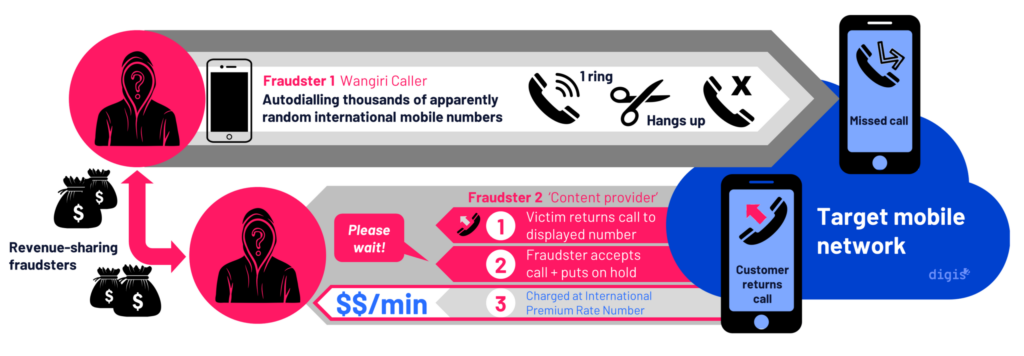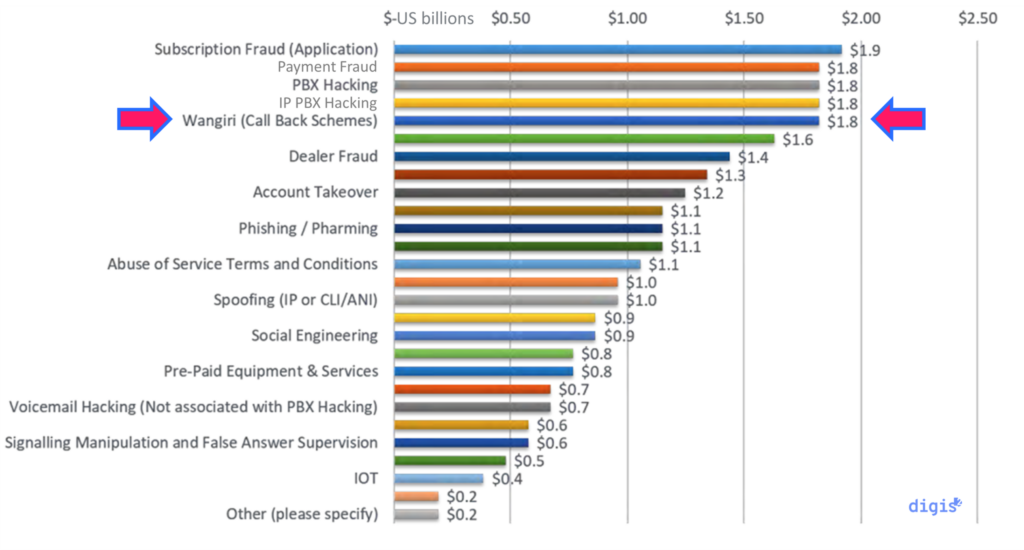Wangiri Fraud Case Study
Co-Founder Yasser ElSabrouty shares a Wangiri Fraud Case Study, a growing and costly type of telecom fraud – what is it, who does it impact?
Digis Squared Chief Business Officer, Yasser Elsabrouty shares a Wangiri Fraud Case Study, a growing and costly type of telecom fraud.
“Fraud in the telecommunications industry has serious impacts on operator finances, brand value, and most importantly, subscriber trust and relations,” shares Yasser. “In this blog, I’ll review the scale of the issue and its impacts, illustrate how Wangiri fraud is undertaken, and share a little on what we’re doing for clients to detect and prevent this fraud.”
How large is fraud in the telecoms sector?
Public data on the scale of the issue is understandably limited. The Communications Fraud Control Association (CFCA) publish a Fraud Loss Survey every 2 years, the most recent was November 2019 [1]. They estimate that over US$ 28 billion of telecom operator revenue was lost to fraud, 1.74%.

In the finance field, fraud is considered an annual financial risk that requires attention to detect and prevent future losses, especially when such losses keep increasing as more time passes and fraudsters become more confident, creative and daring in committing those fraud schemes.
Wangiri Fraud
Wangiri is a callback scam. Its name has its origins in a Japanese word which means “one ring and cut”.

UK Regulator OfCom [3]: “These are calls in which the scammer will ring a person’s phone number but immediately hang up in the hope that the recipient will call back.
If the person calls the number back, they will then find themselves connected to an expensive number, such as an international number, which will be charged at a premium rate. This can leave them facing a costly charge for the call.”
“Considering this in a little more detail, in Wangiri, a fraudster gives a missed call to several victim’s phone number, usually randomly dialled and in different countries, from an international or unusual number. To the user, the CLI, caller number ID, is modified in such a way that it may look like a genuine call. When the victim naively calls back out of curiosity, they will discover later that they have called a premium rate service, PRS, number owned by the fraudster for which the victim is charged heavily for the calls. The fraudster intends to keep the victim on hold for as long as possible to increase the billed amount. The premium rate service provider pays the fraudster a certain share of the call revenue for each minute of call received by the premium rate number.”

“When customers discover the charges on their bills, and talk with their operator, most refund the call cost to the client. This takes time and effort for the operator, and impacts reputation and brand trust. And of course, in the mean time, because of the bill-lag, the Wingiri fraudsters have hit many more clients, and continue to exacerbate the fraud exponentially.”
Telecom operators are facing this type of fraud for over a decade now, and this is only growing exponentially year on year around the globe.

The CFCA 2019 fraud loss survey reported that Wangiri had moved up into the top 5 fraud methods used by fraudsters – after subscription application fraud, it held joint position with payment fraud, PBX hacking, and IP PBX hacking. It is estimated that in 2019, the last date at which data is currently available, telecom operators lost close to US$ 1.82 billion globally to Wangiri fraud.
Case study: impact on one telecom operator group
“To put that another way,” says Yasser, “if we assume the CFCA survey is representative of all telecom operators, then if we consider a real case study for one of our large tier-one operator group customers with 2019 revenue of US$ 20 billion, this report suggests that they would have lost US$ 348 million to fraud, of which US$ 22.4 million would have been lost to Wangiri fraud. Additionally, by taking action against Wangiri, the cost of customer complaints will be reduced by 20%.”
“But these figures tell only part of the story – in addition to the costs associated with handling the customer call, identifying the calls, and processing the refund, a far greater impact for the operator is on reputation, brand value and customer trust, and many would argue the value of that far exceeds any US dollar figure.”
“At Digis Squared we are using our own expertise, tools and methodologies to help many of our customers to detect and prevent Wangiri fraud calls, globally,” said Yasser. “If we can help you with this, please get in touch.”
In conversation with Yasser ElSabrouty, Digis Squared Chief Business Officer and Co-Founder.
If you or your team would like to discover more about our capabilities, please get in touch: use this link or email sales@DigisSquared.com .
Digis Squared, independent telecoms expertise.
Sources,
Image credits
- Digis Squared social media and blog banner image: Mufin Majnun

